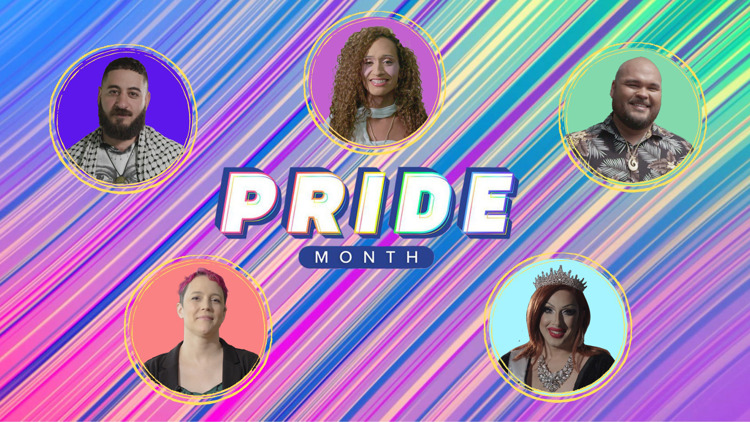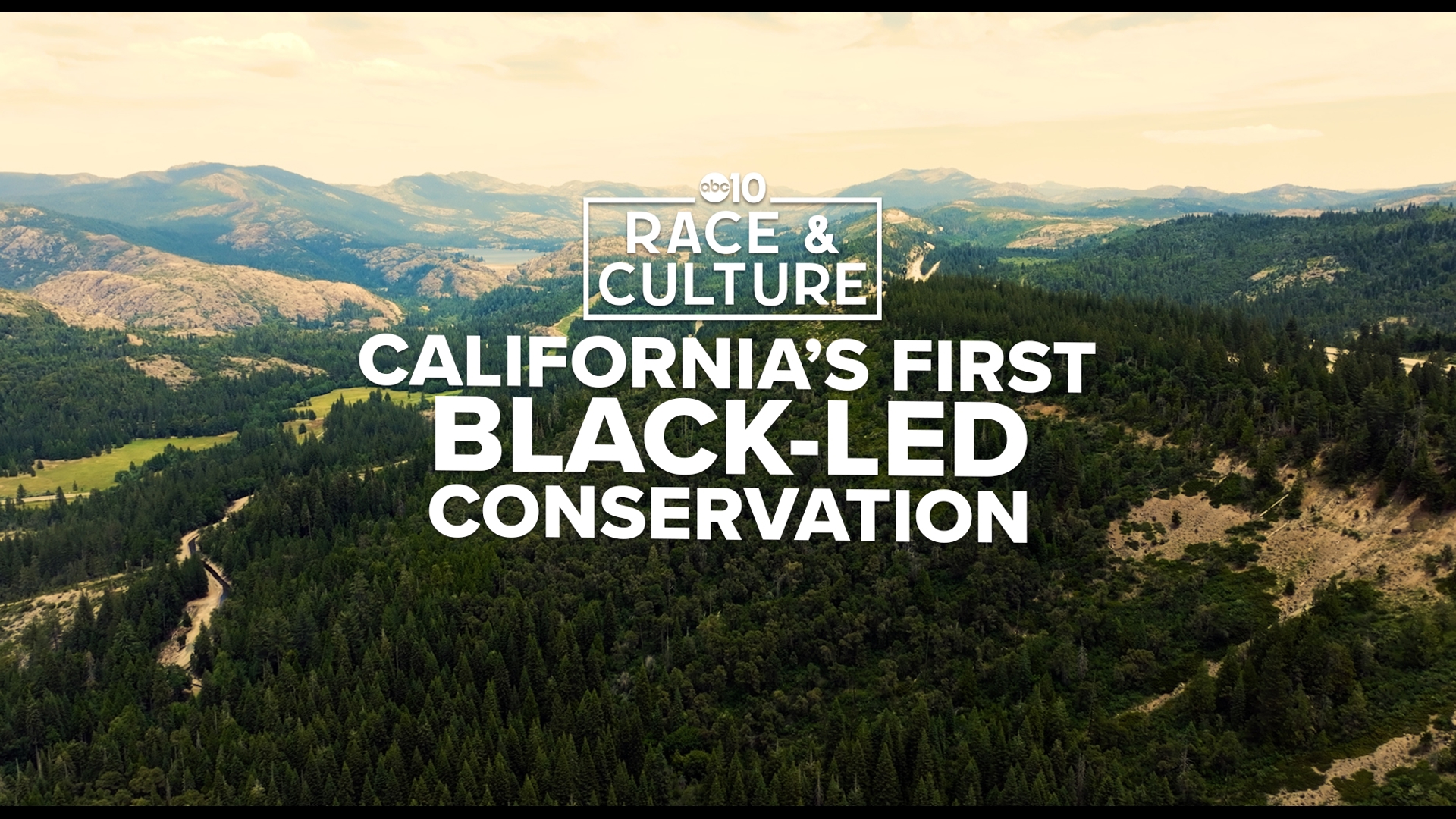SACRAMENTO, Calif. — Joy, community, celebration, resistance, authenticity, a protest for humanity — those were some of the words that came to mind when LGBTQ+ people across Northern California were asked the question: What does Pride Month mean to you?
Each June, we celebrate LGBTQ Pride Month to honor the 1969 Stonewall Uprising, also known as the Stonewall Riots. The Stonewall Uprising describes the six days of protests against law enforcement after New York City police raided the Stonewall Inn, a popular gay club in Greenwich Village, in the early morning hours on June 28, 1969. Although the Stonewall Uprising was not the first time LGBTQ+ people fought for equal rights, it's believed to be a tipping point for the movement in the United States.
Now, 55 years later, the commemorative month continues to recognize the impacts LGBTQ+ individuals have on history.
ABC10 sat down with five people across Northern California as they shared their own lived experiences and spoke about the importance of queer joy and resilience.
You may come across words throughout this article related to sexual orientation and gender identity or expression you are not familiar with or would simply like to know more about. The Human Rights Campaign, the nation's largest LGBTQ+ civil rights organization, has a glossary of terms intended to equip people with the words and meanings to help make conversations and learning easier. You can find the glossary HERE.
Zaheer Suboh
Zaheer Suboh, also known as Subeaux, is a queer Palestinian DJ, producer and community organizer who works in HIV prevention. Suboh's journey and love for music is deeply personal and rooted in his Palestinian identity. He points to the Dabke, a traditional group dance in Palestine often accompanied by instruments and singing, as an example. The Dabke is not only performed during festivals and celebrations, but it's also been a form of cultural resistance to assert Palestinian identity.
Suboh learned how to DJ with the help of YouTube videos during the pandemic. Before then, he hosted gatherings for the queer community in Sacramento and put together music playlists. Suboh blends disco house music with Arabic vocals and instrumentation, pulling inspiration from the music he grew up listening to in Palestine in the 90s and adding a perceived Western flair. He describes his use of house and disco music as a way for him to honor Black and Latino artists who created those genres as part of their own resistance movements.
Suboh is also a self-described "community fabric weaver." He strives to "weave" connections closer together so when crises unfold, communities will better support one another and fight for each other's recognition. He's using his platform now to draw attention to the ongoing plight of Palestinians, as well as share his experiences about being queer in Palestine. Since the militant group Hamas' attack on Israel on Oct. 7 and Israel's subsequent bombardment of Gaza, more people have criticized LGBTQ+ advocates for showing support for Palestine despite homophobia there. Suboh said the fight for both queer and Palestinian liberation is inextricably linked and homophobia isn't unique to Palestine and shouldn't be used to justify oppression of a society.
Emily Autenrieth
Emily Autenrieth (she/ey/em) fell in love with books from a young age, largely in part due to the environment she grew up in. Autenrieth was born in Anchorage, Alaska to an engineer father, and a nurse and volunteer librarian mother. Ey grew up in a supportive home but was surrounded by conservative beliefs. While a student at a private Christian K-12 school, Autenrieth was taught concepts like creationism and was told it was wrong for people to be gay. Books became one of ey's only windows into learning about lives different from her own.
Autenrieth identifies as queer both in terms of gender identity and sexuality. Autenrieth doesn't relate to a lot of pronouns, but discovered the pronouns ey/em from a business called Crafty Queer Studio. Since "em" is short for Emily, Autenrieth felt those pronouns were a compromise between em and the world of pronouns.
Today, Autenrieth is the owner of A Seat at the Table Books, a bookstore café in Elk Grove. Autenrieth wanted to create a space where everyone has "a seat at the table" and feels safe and represented. Every single book is hand-selected and reflects all the diverse identities, backgrounds and experiences in Elk Grove and the greater Sacramento area. Outside of the bookstore café, ey has been active at Elk Grove Unified School District board meetings, pushing against book bans, which historically have limited access to books about racism, sexuality, gender and history. Autenrieth's favorite book of 2024 so far is "The Palace of Eros."
Tilly
Isaac Ruiz (he/him) performs as Tilly (she/her), a gender-fluid drag queen who describes herself as "outgoing, always put together and a diva." Recently, Tilly was also crowned Miss Gay Sacramento 2024 in the annual Sacramento LGBTQIA+ pageant, hosted by The United Courts of Sacramento, Redding, Chico, Stockton (CGNIE). Tilly hopes to use her platform to be a voice for people who feel they aren't heard.
Behind the makeup and the performance, Ruiz is just as outgoing, creative and loves to dance. He was raised Seventh-day Adventist and says religion was deeply rooted in his everyday life. As important as his faith was to him, he also grew up feeling like he had to hide parts of himself as someone who was pansexual. Ruiz has since grown to understand God will accept him no matter what, and for him, being a Christian means to accept and praise everyone, regardless of their gender identity or sexuality. Ruiz was introduced to drag for the first time in 2012 — the rest, he says, was history.
Ruiz said drag is an often misunderstood art form. While club drag, often performed at nightclubs or bars and intended for an adult audience does exist, there are many other forms of drag catering to all ages and are intended to educate, spread joy and influence positive social change. Tilly's range of performances is also just as diverse — doing everything from comedy to gore. Each of Tilly's performances is a platform to evoke joy and create community.
Chris Pangelina
As a queer man of color who is also of mixed Chamorro heritage, Chris Pangelina (he/they) strives to create inclusive environments where people feel seen and safe. It's something he carries in his work as the associate director for the Strategic Asian and Pacific Islander Retention Initiative at UC Davis. Pangelina says he's rarely seen people like himself represented in media, which is why he takes pride in being openly queer and a role model for students on campus.
Pangelina grew up in a house full of boys. He's the second oldest of five brothers, who were all raised by their father. From childhood, Pangelina says he was a target for bullying and slurs because of his "effeminate" traits. He always knew he was attracted to the same gender, but was taught to feel ashamed for having those feelings. Because of this, he didn't come out until he was 22 as an undergrad at UC Berkeley.
In the process of connecting with his identity, Pangelina learned queer and trans individuals in some Indigenous communities, before colonization, were revered and respected. As a result of colonialism, communities became marginalized on the basis of racial and ethnic identity, as well as gender and sexuality. Today, more people are reclaiming those identities. This June, Pangelina says he will definitely "shimmy" throughout Pride on the dance floor — one of his signature moves representing his own liberation.
Aaron Armer
Aaron Armer (she/her) didn't always have the language to say she was transgender. For the majority of her high school experience, she identified as gay because it was all she knew. In 2015, after entering more queer spaces and expanding her knowledge of different gender identities and pronouns, she identified as nonbinary, which she described as her "baby step" into coming out as transgender.
Oftentimes, Armer is the only Black transgender person in a room. While some may find it isolating or intimidating, Armer sees it as an opportunity to enrich others' experiences by sharing what it means to be a Black transgender person. She aims to create learning experiences for others in her day-to-day conversations and is open to sharing about the trans experience with people who are curious or struggling to understand.
Armer said a common misconception, especially when it comes to transgender youth, is children are too young to know who they are. For Armer, being an ally and supporting the transgender community doesn't always have to look like attending a protest. Allyship also includes small everyday actions, such as showing compassion to trans people in the room and helping amplify their voices.
We want to hear from you!
The Race and Culture team's mission is to serve our diverse communities through authentic representation, community engagement and equitable reporting.
Accomplishing our goals of inclusive reporting requires hearing from you. Is there a person or place that you want us to highlight? Email us at raceandculture@abc10.com or fill out the form below.



